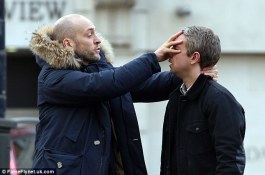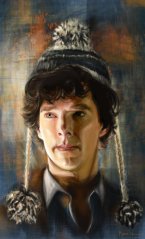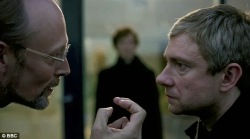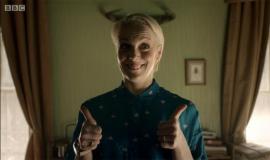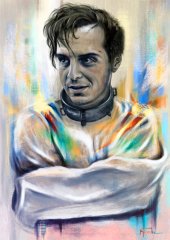Home » Posts tagged 'The Sign of Three'
Tag Archives: The Sign of Three
TV Review: Sherlock (Series 3)
This review contains every major major spoiler there is for series 3.
The Empty Hearse (Episode #1)
After a long two years, The Empty Hearse brought us the return of Sherlock Homes, and it provided an abundance of fan service with it’s very meta approach of depicting several fan theories as to how Sherlock survived the fall. Using this as a way of ultimately not providing us with a definitive answer as to how Sherlock survived his fall was a brave move. Moffat said afterwards that it didn’t have to be complicated – all Sherlock needed was something to break his fall – suggesting that the final theory (in which Sherlock simply jumps onto an air bag and has it moved out of the way before John can see) was the real one, but the episode itself left this open to debate. You couldn’t help but admire the cheek of it.
Less impressive, however, was the lack of any real explanation of why he wouldn’t tell John when so many others already knew; the claim that John would blab felt more like an attempt to piss him off than an actual explanation. A friend of mine suggested that perhaps John was still being watched by Moriarty’s men and so it would be too dangerous for Sherlock to contact him – and that explanation would have been fine. But that isn’t the one that was offered.
I understood why the actual mystery of this episode was relegated to the background, but the fact that the show seemed determined to undermine all of the character development we got last series was less forgiveable. Sherlock’s complete insensitivity to what he had put John through the past few years, and his apparent lack of understanding of how John would feel when he found out Sherlock had lied in the most hideous way, flew in the face of their conversation before the fall. Yes, Sherlock knew he wasn’t about to die, but I read his tears as an acknowledgement about what he was about to do to his friend, not outright lying in order to make John believe he what was happening, which, in my opinion, The Empty Hearse seems to imply. Sherlock is supposed to be insensitive and often an unbearable, but here he seemed even worse than when we first met him. I can accept – hell, I like – that that’s a big part of his character, but in The Empty Hearse it came at the expense of his development over the past two series.
The Sign of Three (Episode #2)
For several reasons I thought The Sign of Three was a much stronger episode. The humour, which they seem to be focusing more on this series, was perfectly balanced with the fun intrigue of the Invisible Man mystery. Seeing Sherlock’s Mind Palace as more than simply text on the screen was a pleasant surprise, especially since the cinematography was so impressive. I also greatly appreciated the show establishing that Mycroft is much cleverer than Sherlock, and later on that Mycroft enjoyed such prominence in the Mind Palace, as the authoritative figure telling Sherlock to think harder.
The Sign of Three also went some way as to alleviate my concerns about the erosion of Sherlock’s previous character development. The conclusion of Sherlock and Mycroft’s little back-and-forth analysis of the hat, revealing to us that in Sherlock’s isolation he’s realised that Sherlock now believed just because he’s different from other people it doesn’t mean he have to be alone, was an immensely satisfying pay-off for his character. And this is what made the ending so heartbreaking – Sherlock has come to this realisation at a time in which he no longer has anyone to truly be with, with John now having Mary and a baby focus on. All around, a much better episode than the first, and probably the best of this series.
His Last Vow (Episode #3)
His Last Vow was tasked with introducing a new villain, building him up as a new match for Sherlock, having him do his villain thing, then having Sherlock eventually emerge victorious. Throw in the big reveal with Mary’s past and the episode feels a bit cluttered and rushed.
However, all these issues I could easily forgive if only the episode didn’t feel so tonally inconsistent. Take the ending, for example; Sherlock murders a man (for the first time, as far as we know) with no more hesitation than the time it took him to yell ‘I’m a high-functioning sociopath!’ We saw no trepidation, or dawning realisation, that there was only one thing he could do to protect John and Mary. Actually presenting it as a terrible decision Sherlock is forced to make would have made for an interesting contrast with The Reichenbach Fall. This time, instead of faking his own death, Sherlock would actually have to take the life of another to protect the people he cares about.
John and Sherlock’s goodbye suffered from the same problem; the tone was incompatible with the situation. I didn’t believe either of them thought this would be the last time they saw each other or, if they did, that it truly hurt either of them to be saying goodbye once again. It was too comedic. Sure, ‘Sherlock is a girl’s name’ was a very funny line and I laughed at it, but we also needed to see the pain it would cause both of them to be parting ways yet again, so soon after being reunited.
There was something about Mary…
I have to say, although something was bound to happen, I was disappointed by Mary’s big reveal. For me, the best thing about her was that she was completely unspectacular in the usual way a Sherlock character would be. What made her special was that she was an ordinary person, yet the first we’ve ever encountered who’s been able to handle both John and Sherlock with such ease. She was people-smart rather than Sherlock-smart, and I loved that about her. So finding out she was yet another genius was a bit of a let down.
This leads me onto another point, which is a slight tangent, but why does cleverness manifest itself in the exact same way for everybody in this show? The cab driver from A Study in Pink, Mycroft, the guy from the drug den, Sherlock’s mother, Magnussen, and now Mary (an argument can be made for Moriarty too but even excluding him there are still five others), are all considered ‘geniuses’ and all appear to think in the exact same way Sherlock does. ‘Cleverness’ seems to be one, hegemonic phenomenon.
One last point about the Mary reveal; though the explanation that John is instinctively attracted to unique and potentially dangerous people makes a lot of sense, I still didn’t believe he somehow, unconsciously or instinctively or whatever. That’s he’s attracted to such people is very plausible, but that he was attracted to Mary for this reason wasn’t.
Summing Up…
The show has always been funny, witty and clever, but where it excelled in the first two series was always with drama, and it felt like the third series was making an active attempt to avoid it. Perhaps they were, as I recall a friend mentioning the writers wanted this series to be more ‘fun’, but I think the comedy is most effective when sprinkled throughout the episodes, or even when it’s weaved between a particularly intriguing case, as it was in The Sign of Three, but it doesn’t work quite as well when it becomes the main focus.
Reading over this post it appears far more negative than I expected it to be but don’t get me wrong; Sherlock is still undoubtedly one of the best shows on television, and there were many things I loved about it, even if criticisms are easier to write about. Magnussen was at times an especially menacing villain; his flicking John’s face was as awkward and uncomfortable to watch as the writers intended. And though I’d rather humour wasn’t the most prevalent aspect of the show, I laughed hard and often. I did think this series was the weakest of the three,but the previous two did set the bar unrealistically high. I completely expect to look at this series with much more fondly by the time the show is finished.
I joked on Twitter after the episode aired that not even the writer’s know how Moriarty could still be alive – they’re just safe in the knowledge they still have a few years to come up with an explanation.


